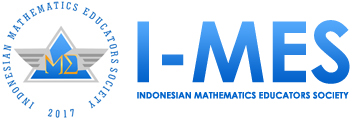An Ethnomathematics Study on the Javanese Astrology
Abstract
Keywords
Full Text:
PDFReferences
Alangui, W. V. (2010). Stone walls and water flows: Interrogating cultural practice and mathematics. Doctoral Dissertation. Auckland: University of Auckland.
Arisetyawan, A., & Supriadi, S. (2020). Ethnomathematics study in calendar system of Baduy tribe. Ethnomathematics Journal, 1(1), 25–29. https://doi.org/10.21831/ej.v1i1.28013
Boland, Y. (2016). Astrology Made Easy: A Guide to Understanding Your Birth Chart. United Kinngdom: Hay House.
Budrisari, F. (2014). Study Ethnomathematics Mengungkap Aspek-Aspek Matematika Pada Penentuan Hari Baik Aktivitas Sehari-Hari Masyarakat Adatkampung Kuta Di Ciamis Jawa Barat. Doctoral Dissertation. Bandung: Universitas Pendidikan Indonesia.
Catepillán, X. (2016). An Ethnomathematics Course and a First-Year Seminar on the Mathematics of the Pre-Columbian Americas. In Association for Women in Mathematics Series (Vol. 7, pp. 273–290). Springer. https://doi.org/10.1007/978-3-319-44950-0_19
Chopra, D., & Kafatos, M. C. (2017). You are the universe: Discovering your cosmic self and why it matters. New York: Harmony.
D’Ambrosio, U. (2016). An overview of the history of Ethnomathematics. In M. Rosa, U. D’Ambrosio, D. C. Orey, L. Shirley, W. V. Alangui, P. Palhares, & M. E. Gavarrete (Ed.). Current and Future Perspectives of Ethnomathematics as A Program (pp. 5- 10). Cham: Springer. https://doi.org/10.1007/978-3-319-30120-4_2
D'Ambrosio, U. (1985). Ethnomathematics and its place in the history and pedagogy of mathematics. For the learning of Mathematics, 5(1), 44-48.
Fajrin, R. (2016). Study Ethnomathematics: Pengungkapan Sistem Penanggalan Kalender Caka Sunda Masyarakat Adat Kampung Cireundeu, Cimahi, Jawa Barat. Doctoral Dissertation. Bandung: Universitas Pendidikan Indonesia.
Fenn, R., & Geertz, C. (1974). The Interpretation of Cultures. Journal for the Scientific Study of Religion, 13(2), 248-249. https://doi.org/10.2307/1384392
Freudenthal, H. (2006). Revisiting mathematics education: China lectures (Vol. 9). Springer Science & Business Media.
Gerber, M., Hunger, H., & Pingree, D. (2001). Astral Sciences in Mesopotamia. Journal of the American Oriental Society, 121(2), 317-319. https://doi.org/10.2307/606596
Homola, S. (2021). Chinese Eight Signs Prediction. Social Analysis, 65(2), 62–81. https://doi.org/10.3167/sa.2021.650204
Jama, J. M. (1999). The role of ethnomathematics in mathematics education cases from the horn of Africa. Zentralblatt Für Didaktik Der Mathematik, 31(3), 92–95. https://doi.org/10.1007/bf02652730
Lara-Alecio, R., Irby, B. J., & Morales-Aldana, L. (2020). A Mathematics Lesson the Mayan Civilization. Teaching Children Mathematics, 5(3), 154–158. https://doi.org/10.5951/tcm.5.3.0154
Monteferrante, S. (2011). Maya mathematics. BSHM Bulletin, 26(2), 71–79. https://doi.org/10.1080/17498430.2010.504962
Muhtadi, D., Sukirwan, W., & Prahmana, R. C. I. (2017). Sundanese ethnomathematics: Mathematical activities in estimating, measuring, and making patterns. Journal on Mathematics Education, 8(2), 185–198. https://doi.org/10.22342/jme.8.2.4055.185-198
Prahmana, R. C. I., Yunianto, W., Rosa, M., & Orey, D. C. (2021). Ethnomathematics: Pranatamangsa system and the birth-death ceremonial in yogyakarta. Journal on Mathematics Education, 12(1), 93–112. https://doi.org/10.22342/JME.12.1.11745.93-112
Restivo, S. P. (1994). Science, society, and values: toward a sociology of objectivity. (1994). Choice Reviews Online, 32(03), 32-1499-32–1499. https://doi.org/10.5860/choice.32-1499
Risdiyanti, I., & Prahmana, R. C. I. (2020). Ethnomathematics (Teori dan Implementasinya: Suatu Pengantar). Yogyakarta: UAD Press.
Risdiyanti, I., Prahmana, R. C. I., & Shahrill, M. (2019). The learning trajectory of social arithmetic using an Indonesian traditional game. Elementary Education Online, 18(4), 2094–2108. https://doi.org/10.17051/ilkonline.2019.639439
Rosa, M., & Orey, D. C. (2016). State of the art in Ethnomathematics. In M. Rosa, U. D’Ambrosio, D. C. Orey, L. Shirley, W. V. Alangui, P. Palhares, & M. E. Gavarrete (Ed.). Current and Future Perspectives of Ethnomathematics as A Program (pp. 11- 37). Cham: Springer. https://doi.org/10.1007/978-3-319-30120-4_3
Suarjana, I. M., Suharta, I. G. P., & Japa, I. G. N. (2014). Etnomatematika Sistem Kalender Bali. Seminar Nasional Riset Inovatif II, 2(2006), 177–182.
Syahrin, M. A. (2015). Study Ethnomathematics Pada Kalender Aboge (Alif, Rebo, Wage) Sebagai Penentu Waktu Hari–Hari Besar Islam Dan Upacara Adat Di Keraton Kasepuhan Cirebon. Doctoral Dissertation. Bandung: Universitas Pendidikan Indonesia.
Umbara, U., Wahyudin, W., & Prabawanto, S. (2021). Exploring Ethnomathematics with Ethnomodeling Methodological Approach: How Does Cigugur Indigenous People Using Calculations to Determine Good Day to Build Houses. Eurasia Journal of Mathematics, Science and Technology Education, 17(2), 1–19. https://doi.org/10.29333/EJMSTE/9673
Utami, N. W., Sayuti, S. A., & Jailani. (2019). Math and mate in javanese primbon: Ethnomathematics study. Journal on Mathematics Education, 10(3), 341–356. https://doi.org/10.22342/jme.10.3.7611.341-356
Refbacks
- There are currently no refbacks.

This work is licensed under a Creative Commons Attribution-NonCommercial-ShareAlike 4.0 International License.
Indonesian Journal of Ethnomathematics
Indonesian Mathematics Educators Society
Jl. Terusan Jend. Sudirman, Kec. Cimahi Tengah, Kota Cimahi, Jawa Barat 40521
E-mail: [email protected]
ISSN: 2775-8001


